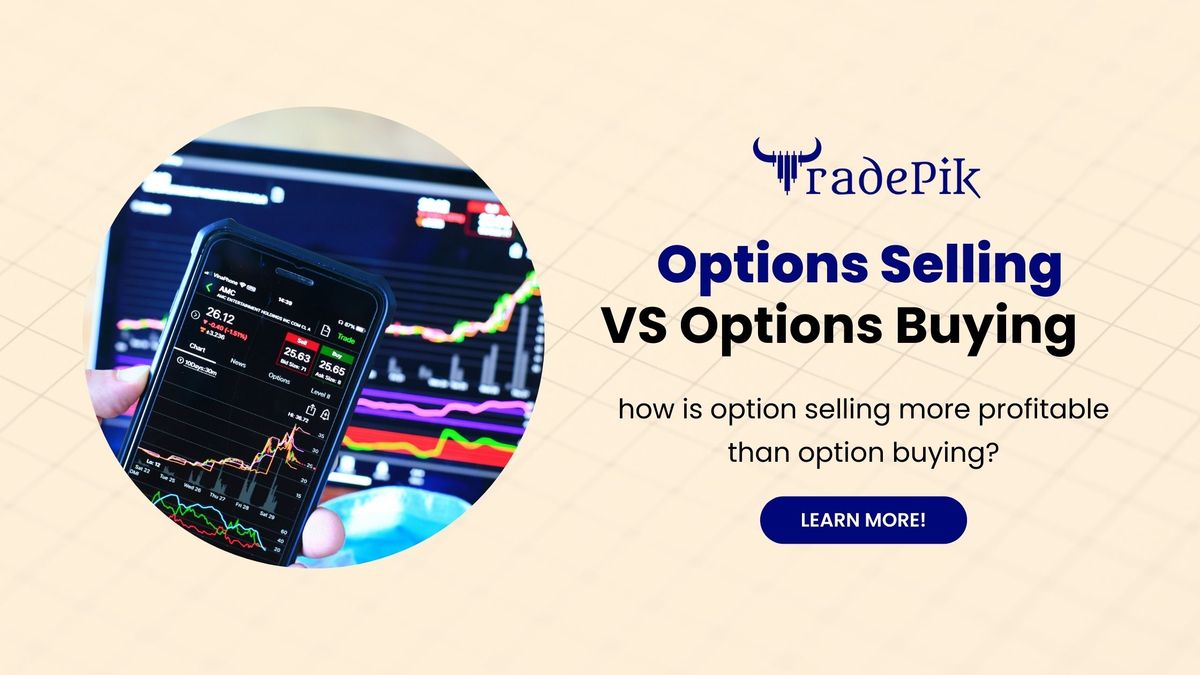Profitability Unveiled: Option Selling vs. Option Buying
In this blog post, we will explore the differences between option selling vs option buying, and discuss the potential advantages and disadvantages of each strategy.

In the world of options trading, there are two main strategies that investors use to profit from the movement of a security’s price: option selling and option buying. In this blog post, we will explore the differences between option selling vs option buying, and discuss the potential advantages and disadvantages of each strategy.
Option selling and option buying are two common strategies used in options trading, which is a form of financial trading that allows investors to speculate on the future price movements of underlying assets such as stocks, bonds, currencies, and commodities.
Both option selling and option buying can be profitable, but option selling can be more profitable in certain circumstances because it allows the trader to collect the premium paid by the option buyer, which can provide a steady stream of income.

What is option selling?
Option selling is the strategy of selling call or put options contracts to other traders. When an investor sells a call option, they are agreeing to sell the underlying asset at a predetermined price (the strike price) on or before a certain date (the expiration date). When an investor sells a put option, they are agreeing to buy the underlying asset at a predetermined price on or before the expiration date.
What is option buying?
Option buying, on the other hand, is the strategy of buying call or put options contracts from other traders. When an investor buys a call option, they are purchasing the right, but not the obligation, to buy the underlying asset at the strike price on or before the expiration date. When an investor buys a put option, they are purchasing the right, but not the obligation, to sell the underlying asset at the strike price on or before the expiration date.
Option selling vs Option buying: how is option selling more profitable than option buying?
Option selling can be more profitable than option buying because the option seller collects the premium paid by the option buyer. This premium is the price of the option contract, and it is paid when the option is purchased.
The option seller can then hold on to the premium and collect the income, regardless of whether the option is exercised or expires worthless. In contrast, the option buyer must pay the premium upfront, and they can only profit if the underlying asset moves in the desired direction and reaches the predetermined price before the expiration date.
Another advantage of option selling is that it allows the trader to profit from time decay. Time decay refers to the decline in the value of an option contract as it approaches the expiration date.
Since the option seller collects the premium upfront, they can profit from the time decay of the option even if the underlying asset does not move in the desired direction. This can provide a steady stream of income for the option seller, even in a sideways or range-bound market.
Option selling also allows the trader to potentially profit from a wide range of market conditions.
When the trader sells a call option, they can profit if the underlying asset remains below the strike price at the expiration date. When the trader sells a put option, they can profit if the underlying asset remains above the strike price at the expiration date.
This means that the option seller can potentially profit from both bullish and bearish market conditions, whereas the option buyer can only profit from one of these market conditions.
However, option selling also carries more risk than option buying because the option seller is exposed to unlimited losses if the underlying asset moves significantly in the wrong direction.
For example, if the trader sells a call option and the underlying asset skyrockets above the strike price, the option seller will be forced to sell the asset at the strike price, resulting in a loss.
Similarly, if the trader sells a put option and the underlying asset plummets below the strike price, the option seller will be forced to buy the asset at the strike price, resulting in a loss.
Conclusion: Option selling vs option buying
In conclusion, option selling can be more profitable than option buying because it allows the trader to collect the premium paid by the option buyer, profit from time decay, and potentially profit from a wide range of market conditions.
However, it also carries more risk because the option seller is exposed to unlimited losses if the underlying asset moves significantly in the wrong direction. As with any investment strategy, it is important for traders to carefully evaluate their risk profile and choose accordingly.
If you want to learn these options trading strategies, bank nifty weekly expiry options strategy and their adjustments in more practical ways with live mentorship, You can enroll in our Option Strategies – A Mentorship Program.
Much Check this also-
- Deploying short strangle by looking profit/loss at the payoff chart? – A must read for beginners!
- Why is psychology important in options trading?
- 3 Simple Options Strategies for High Volatility
Post your comments in the comment box if you have a query related to this weekly Indian Market Outlook. You can ask any question related to bank nifty weekly expiry options strategy in the comment box.
If you need more real-time assistance on the Nifty and Bank Nifty weekly expiry strategy or want to deploy these hedging trading strategies for monthly Income, can enrol to our Mentorship program.

Options Strategies – A Mentorship Program 3.0
Learn About Trading Options in a course led by an Industry Expert. It doesn’t matter how old you are, the mentorship program is open to everyone who wants to learn more about the various option trading strategies. You’ll learn everything you need to know about these strategies and more. Don’t wait, Enroll today!
DISCLAIMER: We are not a SEBI research analysts. Views and trading strategies are posted in this weekly market newsletter only for educational purposes. There is no liability whatsoever for any loss arising from the use of this product or its contents. This product is not a recommendation to buy or sell, but rather a guideline to interpreting specified analysis methods. This information should only be used by investors and traders aware of the risk inherent in securities trading.





